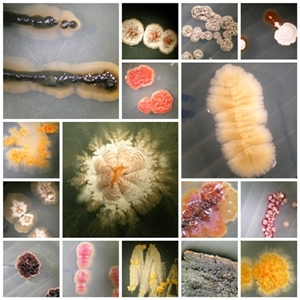Since its inception in 2005, the BIOTEC-Novartis Partnership in Drug Discovery has proved to be a highly productive and successful collaboration. Building on this, the two organizations have recently finalized the extension of the partnership for a further three years until 2014. In this phase, the collaboration aims to investigate the potential of compounds produced by local microorganisms (natural products) as active ingredients for drugs.

The key to developing a modern drug is to search for a substance that will serve as an active principle for a specific therapeutic intervention. This substance can be man-made (a synthetic compound) or derived from living organisms (a natural compound). Natural compounds have an advantage over synthetic ones in that they often possess complex chemical structures that cannot be easily replicated artificially, which might serve as core structures for the synthesis of drug-like compounds with very specific activity to target.
To find a biologically active compound, extracts from plants, animals or microorganisms are passed through different biological assays to determine the activity against specific targets such as malaria, tuberculosis or cholesterol. Once the crude extract shows positive results, natural products chemists will use various methods to fractionate and identify an active compound from mixtures of compounds in that extract. Most of the time, these compounds require further chemical modification in order to improve their pharmacological profiles in terms of properties such as solubility, stability, efficacy, toxicity, oral bioavailability. Subsequently, these “lead compounds” are assessed in pre-clinical test systems (efficacy, safety and pharmacokinetic study in animals), followed by 3 clinical phases in humans to compile data on efficacy, safety, and formulation. After submission to the regulatory authorities such as the US Food and Drug Administration (FDA) for review, approval for market introduction is granted. On average, it takes approximately 14 years and a budget of USD 1.7 billion to develop each medicine.
Executives on both sides of the partnership share a strong belief in the value delivered by the collaboration.
“Partnership with a pharmaceutical company is a crucial step to realize our upstream research in natural products for medicine, because a pharmaceutical company possesses both the proprietary knowledge and funds to carry it forward,” said Dr. Kanyawim Kirtikara, BIOTEC Executive Director.
Over the past six years of collaboration, as many as 7,200 microbial isolates and 115 pure compounds have been investigated. Many of the microorganisms have proven their ability to produce new compounds.
“This partnership will help us better understand the diverse range of interesting natural compounds from the biodiversity found in Thailand” added Mr. Richard Abela, Country President of Novartis Thailand. “Our aim is to partner with BIOTEC to explore the potential of Thailand’s biodiversity and potentially discover innovative medicines targeted to treat diseases such as cancer, heart disease, diabetes and tropical diseases.” The partnership also values the importance of building research capabilities for developing countries like Thailand. “Through our collaboration with BIOTEC, Novartis will train scientists, and expose them to cutting edge technology and hopefully contribute to BIOTEC’s development” said Mr. Richard Abela.
This is achieved through full internship scholarships for Thai researchers at Novartis research laboratories in Switzerland, and visits of Novartis experts to BIOTEC laboratories to provide advice and training for young scientists. “The transfer of technology in the isolation and handling of actinomycetes enables BIOTEC to build our highly diversified and rare actinomycetes collection, accumulating over 6,000 strains over the past 6 years,” said Dr. Kanyawim.
Actinomycetes is a type of bacteria known to be the main source of clinically important antibiotics. Dr. Kanyawim added that “the new anti- tick assay, transferred from Novartis Animal Health, also enables us to find potential ingredients for animal health products, a market that is expanding at a rapid rate.”
For the next three years, BIOTEC will be more involved in research through conducting in-country phenotypic pre-screens to detect anti-parasitic activity in microbial strains, before further investigation by Novartis. Training to be provided to Thai scientists will include natural product dereplication in active extracts from phenotypic screens, compound purification and anti-bacterial testing.
